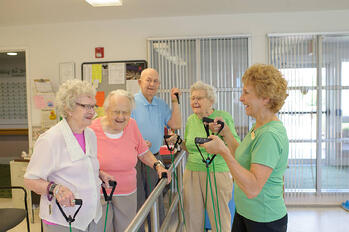 Maintaining a healthy weight is an important part of reducing chronic disease, maintaining independence, and achieving comprehensive wellness.
Maintaining a healthy weight is an important part of reducing chronic disease, maintaining independence, and achieving comprehensive wellness.
March offers the perfect chance to help seniors struggling with weight issues “Bite Into a Healthy Lifestyle” with the observation of National Nutrition Month.
Read on to learn how you can help your aging loved one reach his/her weight goals and enjoy an enhanced quality of life.
Activity Matters
Many seniors gain weight as they age due to an increase in sedentary behavior and corresponding decline in daily caloric needs. One quick way to help your aging loved one reverse this life-threatening trend? Encourage an active lifestyle!
Health care professionals recommend between 30 to 60 minutes of moderate intensity physical activity every day. While this may sound like a lot, it can be spread into manageable chunks throughout the day. Some may prefer sweating the full hour out on the treadmill while others seek out a mix of activities, including everything from gardening to cleaning the house.
Many seniors enjoy walking and biking, while swimming offers a beneficial low-impact workout. And don’t forget about strength-training. Muscle is more efficient at burning calories than fat, so building lean muscle mass is an effective weight management technique.
Healthy Food Choices
Low-calorie, heart-healthy foods offer countless benefits at any age, especially in the golden years. Encourage your aging loved one to strive for a plant-based diet rich in fruits, vegetables and whole grains.
Fish, beans, lean meats, and low-fat milk products are also beneficial choices. Processed foods, as well as those that are high in calories and trans and saturated fats, offer little nutritional value and should be avoided whenever possible.
Limiting salt intake is also important: the CDC recommends consuming no more than a single teaspoon of sodium (2,300 mg) every day. The American Heart Association recommends an even lower daily target: just 1,500 mg.
And even when your aging loved one doesn’t feel thirsty, hydration is still critically important. Seniors are particularly susceptible to dehydration so encourage your loved one to avoid caffeinated beverages and drink plenty of water. This has many extraordinary benefits, including weight control.
Show Your Support
Changing habits can be difficult for anyone, especially after a lifetime of less-than-healthy choices. Offer plenty of positive support for your loved one’s efforts along the way, and refrain from criticism or judgment. Remember, baby steps are fine; even small changes can have significant results.
Key Takeaways
- While losing weight is important at any age, it’s particularly important for seniors who are at a heightened risk of developing chronic diseases and other health concerns.
- Positive lifestyle choices, including exercising and eating right, offer a multitude of health benefits.
- Be sure to consult with your aging loved one’s physician before attempting any new exercise program.
- Your loved one may stumble or be resistant to change: offer positive support, not criticism.

